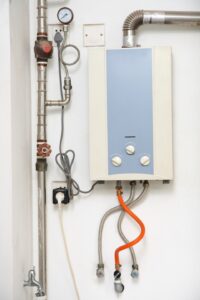We’ve discussed before the benefits of having a tankless water heater. They’re great upgrades for customers who really want to ditch the old and wasteful tank system, and invest in a system that can heat water as it enters your home. However, no system is perfect, and today we’d like to talk about some problems that many tankless water heater owners might be familiar with.
Remember, a water heater is designed to efficiently and effectively bring you hot water for all your daily needs. If it can’t, then there’s something wrong with it and you should call for water heater service in Evansdale, IA.
And, to make things crystal clear, this isn’t an exhaustive list of all problems that can occur with a water heater. That list is way too long for a blog post. Just make sure you schedule a repair appointment if you think something is amiss.
1. An Overload
Tankless water heaters are exceptional pieces of technology, but they’re not without their faults. One of those faults can be frequent overloads, which is when multiple people in a home require hot water all at once.
Think about it this way–a tank water heater always has a certain amount of hot water it can provide to your home. Even if everyone uses the sink all at once, as long as you don’t use more than what’s in the tank, you can all get access to hot water at once with no waiting.
A tankless water heater heats the water as it enters your home, meaning it can get overloaded if every appliance requires hot water all at once. Sure, you can upgrade your tankless system to be larger, but that will always be a problem since it doesn’t have water stored up and ready to go.
One way to mitigate this problem is to regulate showers, laundry, dishwashing, and other hot water using times so that they’re spread out throughout the day. This ensures the system doesn’t get overloaded all at once.
2. Sediment Buildup and Corrosion
A tankless water heater doesn’t deal with as much sediment buildup and corrosion as a tank system, but it still does. Anywhere your system has contact with water, there will be sediment buildup or corrosion.
Sediment buildup is when the microscopic minerals in your water solidify and settle in your water heater. They can eventually cause a blockage or even reduce the system’s ability to heat the water as it enters your home.
Corrosion is simply the weakening of your pipes and appliances through oxidation. Eventually, no matter how sturdy your water heater is, it will start to corrode and require replacement. Luckily, with tankless systems, this can be almost after 20 years or more.
3. A Problem With the Heating Element
Every tankless water heater has a heating element. Whether it’s a burner or an electric coil system, it’s required for the water to heat. If you detect that your water is cold or not hot enough, there could be a problem with the heating element or the temperature regulator.
Unfortunately, this is a problem that must be dealt with by a professional. Don’t hesitate to set up an appointment with us ASAP.
At Dalton Plumbing, Heating, Cooling, Electric and Fireplaces, Inc., your comfort is our promise! To set up an appointment in the Cedar Falls area, give us a call at the number above, email customerservice@daltonphc.com or schedule an appointment online.

